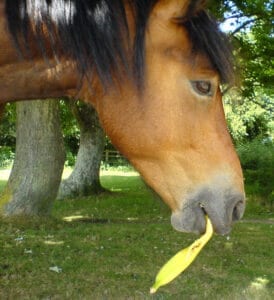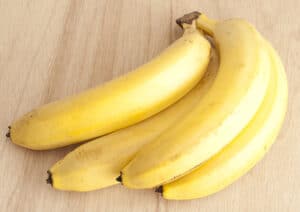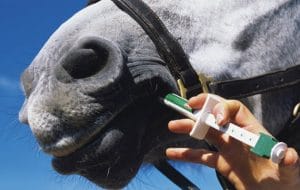We all know that horses will eat pretty much anything and everything that’s offered to them and bananas are by no means an exception, while some fussy horses will turn their nose up at something they don’t know, most horses will devour bananas the second they see them! But does that mean they should be eating them? To put it simply yes, there’s absolutely no reason why you shouldn’t feed bananas to a healthy horse.
Unlike a lot of other animals horses, just like us, have a very sweet tooth which is one of the reasons why they like bananas so much.
Are bananas healthy for horses?
As well as tasting delicious bananas contain a high amount of potassium as well as other minerals and vitamins which means that, as well as satisfying your horse’s sweet tooth, they’re also a healthy treat too with a plethora of benefits:
- Potassium – As well as helping the muscles and nerves to work, potassium will also help to keep your horse’s heart healthy.
- Vitamin B6 – This helps your horse’s body to turn carbohydrates and fats into energy.
- Vitamin C – Not just an immune booster, vitamin C will also help your horse to stay healthy by assisting with repairing any cell and tissue damage.
- Digestion – When fed in moderation bananas can not only aid digestion but also help to treat some minor gastrointestinal problems.
- Energy – Bananas are also a great source of energy which is one come competitive riders will feed their horses bananas before a competition.
While bananas are a good healthy treat to feed your horse its important to only feel them fresh bananas. They can eat dried banana chips but their small size and solid nature make them more of a choking hazard so should be avoided. The drying process in banana chips also removes a lot of the nutrients while at the same time increasing the amount of sugar.
Can horses eat banana peel?

Like many other fruits, the peel of a banana can be quite bitter tasting but that doesn’t mean to say that horses can’t, or shouldn’t, eat them. Just like us, some horses will like the taste and others won’t but as long as you wash the peel to make sure it’s free from pesticides and remove any stickers there’s no reason why your horse can’t eat the peel.
Just like the rest of the banana, the peel is high in potassium as well as vitamins B6 and B12 so eating it certainly won’t do your horse any harm at all. If he doesn’t seem to like it though don’t worry, some horses are wary of any new foods so offer it to him again on a different day and he may well choose to eat it.
Are all horses okay to eat bananas?
While bananas are perfectly safe and healthy for most horses to eat there are occasions when you have to be careful what you feed horses. For example, horses that suffer from obesity as well as those that are insulin resistant have to be very careful how much sugar they consume which means that in most cases bananas are a no-no. Horses with a genetic muscle disease known as Hyperkalemic Periodic Paralysis (or HYPP) have to keep their levels of potassium low due to the mutations the disease can cause so must also avoid bananas at all cost.
If you’re not sure whether or not your horse is okay to eat bananas its always better to check with your veterinarian who will be able to advise you, they’ll also be able to tell you how many bananas your horse can safely eat.
Can bananas help to treat stomach ulcers?
Bananas can not only be used to treat gastric ulcers but, when fed in the right way, can also help to prevent them from occurring in the first place. They do this because of their high levels of phospholipids which are known to increase the mucus in the stomach which acts as a lining that protects the sensitive stomach wall from damage caused by acid.
It’s believed that unripe will encourage even more mucus to be produced but there haven’t been any studies to back this up conclusively. As well as preventing ulcers, unripe bananas will help to promote cell growth within the digestive system and therefore repairing the damage caused by ulcers.
Feeding bananas to older older horses
Bananas, especially ones that are soft can actually be beneficial to older horses and those that have dental issues making it difficult for them to chew their food properly. Depending on how soft the bananas are you can either feed it to them directly or mash it to make it softer before feeding it to them.
It’s important to remember that just because you’ve mashed the banana to a pulp you should still feed them the same amount as you would do for other horses (unless your veterinarian tells you otherwise). When you blend fruits (or mash them) you’re also getting rid of a lot of water, any trapped air and altering the molecular structure which often means the resulting mash looks like there’s a lot less than there was before but in terms of sugar content it’s still the same.
How many bananas can a horse eat?

There’s no definitive answer to how many bananas you should be feeding your horse but many equine nutritionists recommend feeding them in moderation and suggest no more than two a week. Bananas are high in sugar (even if they’re unripe) which can not only cause dental problems but also other health issues. Too much sugar can also increase the amount of energy your horse has which isn’t necessarily a good thing – especially if your horse doesn’t have a way of getting rid of the excess energy.
Bananas also contain a lot of starch which can be difficult for a horse to digest, especially in large quantities. They also have a lot of pectins which is a fiber that draws water from the intestines and can result in constipation.
Some horses can eat more than two bananas a week without suffering any side effects so if you do want to feed your horse more then you should speak to your veterinarian.
Feeding your horse bananas for the first time?
If you’ve never fed your horse bananas before then try him with a little bit first of all, horses have a very sensitive digestive system that can be upset easily if there’s a sudden change. Introducing your horse to any new foods slowly will reduce the risk of colic.
Not all horses like bananas (just as not all humans do) so if you feed them a small amount it doesn’t matter too much.
How should you feed bananas to a horse?
While some people will feed whole bananas to their horses without any adverse effects you should either chop the banana into smaller chunks or mash it up before feeding it to your horse. The smaller pieces will reduce the chance of him choking on it.
If you don’t want to feed your horse plain bananas why not make treats some with them instead? You make all sorts of fun treats such as frozen banana lollies.
Using bananas to a disguise medicine

Let’s be honest we’re not keen on taking foul-tasting medicine even if we know it’s doing us good and horses are no different but you can use bananas to ‘trick’ them into taking the medicine. Simply cut a chunk of banana and push the tablet(s) into the middle and your horse will eat it so quickly he won’t realize there was any medicine inside. If your horse’s medicine is in powder form you can mix a bit of banana with the powder to disguise the taste.
If your horse doesn’t like being dewormed (okay so I admit no horse actually likes deworming paste) then you can use an old syringe and a bit of soft, mushy banana to stop your horse associating the syringe with the horrible tasting paste. Just rinse out an old deworming tube and fill it with a bit of mashed up banana, you can then give that to your horse the same way you would give him dewormer. He’ll quickly learn that the syringe doesn’t necessarily mean nasty tasting medicine.
Conclusion
Bananas are a great healthy treat to feed to horses but they should always be fed in moderation, if you’re not sure about your horse eating them then speak to your veterinarian for advice.
Further reading
- Surprising foods to feed your horse
- How coconut oil benefits horses
- What you should NEVER feed horses
- Healthy homemade treats for your horse
- Do horses actually need supplements?
- Feeding a hard keeper on a budget
- Keeping a horse with no pasture
- Why do horses eat mud?
I hope you found this article helpful. If you did I’d be grateful if you could share it please as it would really help me.
Recommended products
Over the years I have tried hundreds of different horsey products, from various blankets and halters to different treats. Some I’ve loved, others I’ve hated but I thought I’d share with you my top all-time favorite products, the ones I never leave the yard without. I’ve included links to the products (which are in no particular order) that I really think are great.
- Horse Knots by Reference Ready – If you’re like me and enjoy pocket reference guides then you’ll love this knot tying guide. These handy cards can easily fit in your pocket or attach to the saddle for quick reference. They’re waterproof, durable and are color coded to make them easy to follow.
- Mane ’n Tail Detangler – Even if you never show your horse you’ll need to detangle his tail from time to time (and possibly his mane too) which is always a challenging chore! I’ve found that if I run a little bit of detangler through my horse’s tails every few days it stops them from getting matted up and makes combing them easy, even if they’re coated in mud. I don’t know if I should admit to this or not but it also works wonders on my hair.
- TAKEKIT Pro clippers – Over the years I’ve tried a lot of different clippers and while some were obviously better than others I found these to be by far the best. They are heavier than a lot of other clippers but for me, that’s a good thing, it makes them feel more sturdy and hardwearing. On top of that they have a range of speeds so are just as good for clipping your horse’s back as they are his face. I also like the fact that they come in a handy carry case but that’s not for everybody. The company that makes them is super good and incredibly helpful too, a real bonus these days. The only thing I wasn’t keen on was the fact that it doesn’t come with any oil, but that’s not a major problem as it’s not difficult to buy lubricant.
- Shire’s ball feeder – There are so many boredom buster toys out there but I like to use these every day, regardless of whether or not my horses are bored. I find that it helps to encourage my horses to problem solve by rewarding them with treats (or pieces of fruit) but it also mimics their natural grazing behavior which helps to keep them calm and de-stressed.
- Horse safe mirror – This is a strange one that many people are surprised about but I like to put horse safe mirrors in the trailers as well as in the quarantine stalls. It helps to prevent the feeling of isolation by giving the impression of other horses being around. Being herd animals horses can get extremely stressed when they feel that they’re on their own but with these stick-on mirrors, they believe that at least one other horse is with them.
- Rectal thermometer – I know this isn’t glamourous at all but it’s vital for your horse’s well-being to be able to check their temperature and a rectal thermometer is the easiest way of doing this which is why I’ve added it to the list.
Shopping lists
I’ve also put together a few shopping lists of essential items that I’ve found helpful over the years. I’ve broken the lists down into different categories rather than put everything in one massive list 😉

